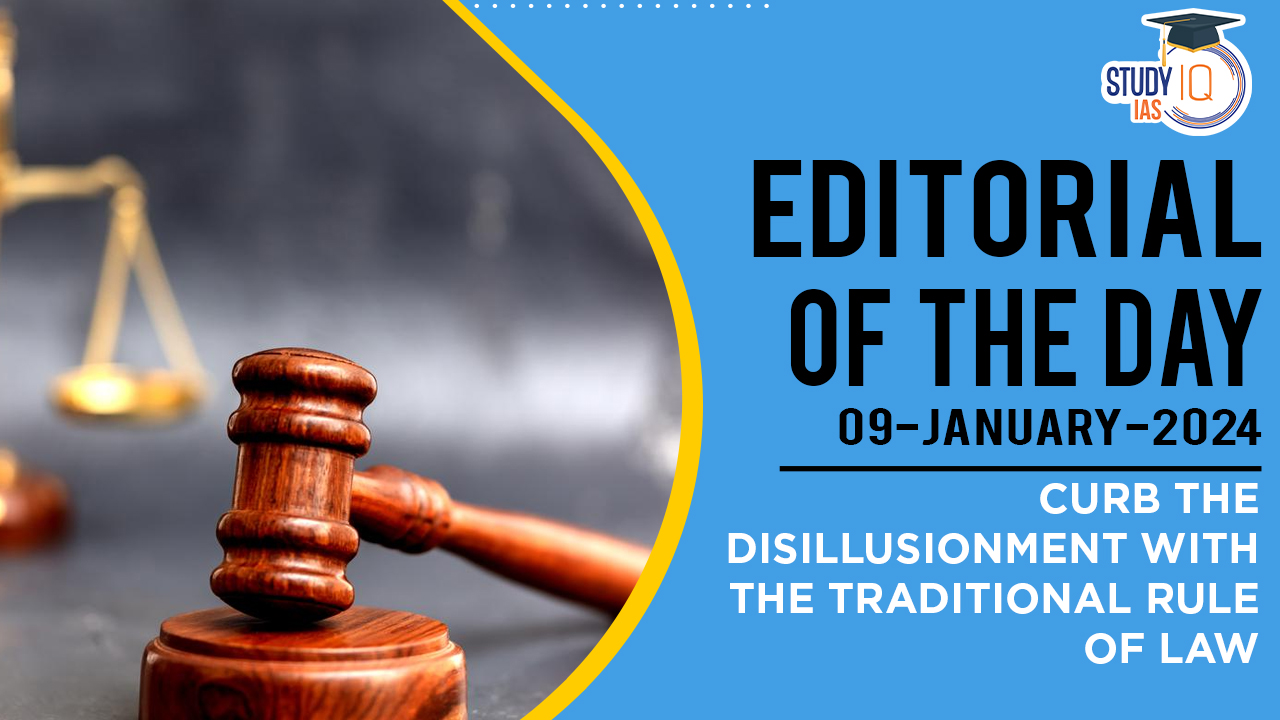Table of Contents
Context: The article examines India’s legal reforms and challenges in justice implementation, contrasting traditional and modern law enforcement methods, and underscores the importance of due process in maintaining rule of law integrity.
Essential Condition for the Continued Trust in the Rule of Law
- Maintenance of Social Order: Laws, such as the Constitution of India, define the boundaries of right and wrong, thus preserving societal order and stability.
- Promotion of Fairness: The legal system upholds justice and equality. The example of Gandhi’s non-violent protest against the British salt tax demonstrates resistance against unjust laws.
- Support for Contemporary Governance: Modernising archaic laws, as exemplified by the Jan Vishwas Act, is crucial for ensuring that legal frameworks are relevant and responsive to current societal needs and issues.
- Safeguarding of Rights and Liberties: Legal provisions are instrumental in protecting individual rights and freedoms, guaranteeing fair treatment for all citizens under the rule of law.
We’re now on WhatsApp. Click to Join
Changes in Indian Laws
- Comprehensive review of problematic laws led to the enactment of the Jan Vishwas (Amendment of Provision) Act, 2023.
- This Act amended 42 central Acts, including the Indian Post Office Act, 1898, the Railways Act, 1989, and the Cinematograph Act, 1952.
- Outdated colonial-era laws such as the Indian Penal Code, 1860, the Code of Criminal Procedure, 1973, and the Indian Evidence Act, 1872 were replaced.
- New legislations introduced include the Bharatiya Nyaya (Second) Sanhita, the Bharatiya Nagarik Suraksha (Second) Sanhita, and the Bharatiya Sakshya (Second) Bill, 2023.
Concerns about the current state of the ‘Rule of Law’
- Policing Tactics Overriding Traditional Investigation:
- The shift from traditional investigation methods to more direct approaches like ‘encounter killings’ and ‘bulldozer’ policing.
- These methods often receive popular support but lack adequate debate and democratic checks and balances, leading to potential abuse.
- Custodial Torture and Civilian Deaths in Poonch District:
- Allegations of brutal and high-handed actions by security forces following an ambush on Army vehicles.
- The response of the security forces, described as the “worst ghosts of the past”, was criticised for its harshness and lack of accountability.
- Concerns About Abridged Rule of Law:
- The modern trend towards a ‘shortcut’ approach to the rule of law, focusing on quick, reactive justice rather than due process.
- This approach raises questions about fairness and the randomness of targeting individuals for punitive actions.
Steps to Enhance Rule Of Law and Justice
- Adherence to Established Legal Procedures: Prioritise established legal protocols over expedient, forceful approaches to maintain fairness in the justice system.
- Proper Investigation Over Aggressive Tactics: Replace methods like encounters and bulldozer demolitions with thorough investigations that include evidence collection and adherence to due process.
- Regular Legal Framework Updates: Continuously modernise laws, as exemplified by the Jan Vishwas Act, to ensure their relevance and fairness.
- Principle-Based Law Enforcement: Emphasise law enforcement practices grounded in legality, necessity, and impartiality.
- Enhancing Public Legal Awareness: Boost public understanding of legal rights and procedures to cultivate a society deeply respectful of the rule of law.


 5 Years of SVAMITVA Scheme and Its Benef...
5 Years of SVAMITVA Scheme and Its Benef...
 Places in News for UPSC 2025 for Prelims...
Places in News for UPSC 2025 for Prelims...
 Countercyclical Capital Buffer (CCyB): P...
Countercyclical Capital Buffer (CCyB): P...





















